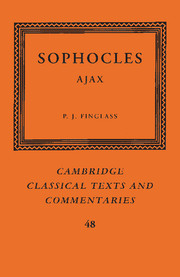Introduction
Published online by Cambridge University Press: 05 June 2012
Summary
Date
Sophocles was probably born in the early 490s and died in late 406. Eusebius dates his first production to 470; the Parian Marble puts his first victory in 468. An anecdote in Plutarch describes how Cimon and his fellow generals awarded the first prize in 468 to Sophocles, who was producing for the first time. But since the anecdote contains some fictitious material, Scullion (2002) 87–90 argues that the detail that Sophocles was competing for the first time could also have been made up, with the intention of making Aeschylus’ loss more biting. He argues that Sophocles could have competed in, say, 477 at the age of 19 (assuming a birth year of 496), which may be the age at which Aristophanes first produced a play on his own behalf; Eupolis is said to have competed at seventeen. If we insist on tragic comparanda, Aeschylus first competed at around twenty-five, Euripides at thirty; if Sophocles first competed at the same age as Aeschylus, his inaugural tetralogy would have been produced between 473 and 471. Such considerations make Eusebius’ date of 470 attractive, but we cannot rule out the possibility of earlier participation. This leaves eight different decades in which the first performance of Ajax could fall.
We can begin by ruling out a very early date, since our play requires a skene building. This was in use for Aeschylus’ Oresteia in 458, but is not required for his Persae (472), Septem (467), or Supplices (470s/460s); hence it was probably introduced some time after 467 and before 458. Hence Ajax cannot be earlier than 466.
- Type
- Chapter
- Information
- Sophocles: Ajax , pp. 1 - 70Publisher: Cambridge University PressPrint publication year: 2011
- 1
- Cited by

